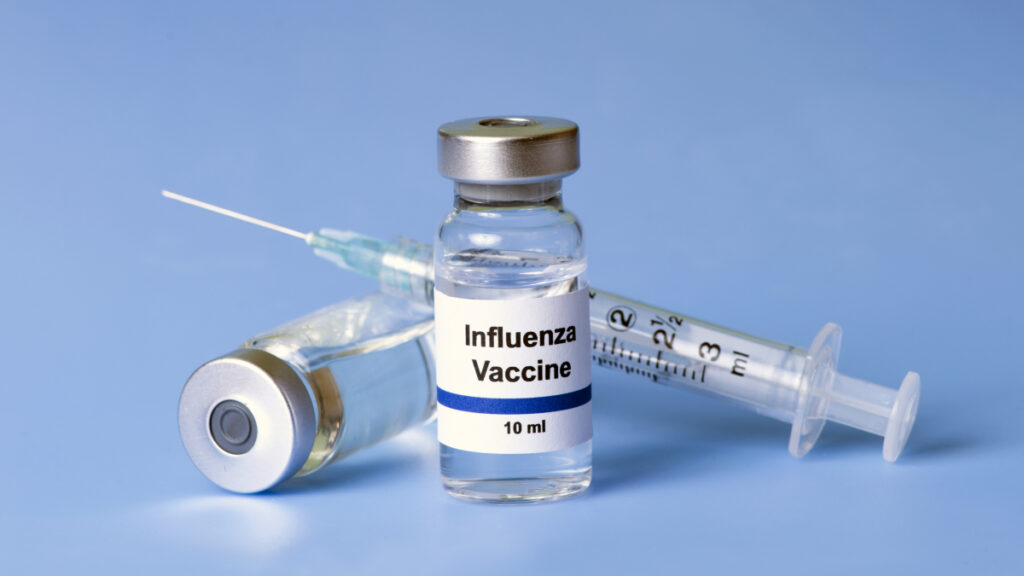
OVERVIEW
The flu vaccine, also the influenza vaccine, is a vaccine that gives individual protection against four influenza viruses. The vaccine is mostly given as shots (injections) in the arm; hence it is sometimes called flu shots. The flu vaccine is also available as nasal sprays.
Influenza (flu) is a viral respiratory disease that causes respiratory complications in people, mostly the elderly and people with other medical conditions. In some people, the condition will make them slightly uncomfortable, while it could cause severe complications in others.
The influenza virus modifies itself each year, making yearly vaccination necessary. The flu vaccine is not a hundred per cent effective, but it provides the best protection against influenza.
KEY POINTS
- Flu shots provide over fifty per cent protection against the influenza virus.
- The vaccination is administered yearly during the flu season.
- The administration of the vaccine is either as an injection or nasal spray. The injections are available for people between 6 months and above, while the nasal spray is for people between 2 years and 49 years.
- Side effects of flu shots are usually mild and don’t last long. More severe reactions are rare due to an allergy to the flu shot ingredients.
- Without vaccination, flu can cause other infections such as pneumonia, bronchitis or otitis.
PEOPLE WHO SHOULD GET THE FLU VACCINE
The flu vaccine protects people at risk of developing severe and life-threatening respiratory complications due to the influenza virus. These include:
- Pregnant women
- Elderly people
- Young children
- People with medical conditions and weakened immune system
- People who receive long-term residential care
According to the C.D.C., the flu vaccine should be administered yearly to people who are six months and above. The reason is because of the rapid evolution of the virus each year.
During flu vaccinations, there is a stimulation immune system to produce antibodies against the influenza virus. These antibodies wear off with time. Thus the antibodies generated from the past year will not be able to protect against the virus next year, another reason for the yearly vaccination.
IS THE FLU VACCINE EFFECTIVE?
The flu vaccine is not a hundred per cent effective, but it is the best preventive measure for influenza. It reduces the chances of coming down with flu by over fifty per cent.
The flu vaccine is most effective when taken before the flu season. The flu season is the time of the year when influence (flu) is most prevalent. Influenza occurs year-round, but its incidence is more at certain times of the year.
The flu season varies based on geographic location. In the United States, the flu season is from October to May, peaking in February. In African countries like Nigeria, the flu season is during the harmattan period, from October to February.
The flu vaccine is effective 10 to 14 days after vaccination. If an individual contacts the virus before the 10th day, they might come down with the flu, but it will be mild and short-lived.
HOW IS THE FLU VACCINE ADMINISTERED?
Two delivery systems administer the flu vaccine. The most common administration method is by injection (flu shots).
Injection flu vaccine: The injection delivery system is the most common way of flu vaccination. It is through injection with a needle into the arm muscle (intramuscular).
People, less than 65 years of age might receive the vaccine intradermally (in the skin). This method will reduce the reactions due to the intramuscular route of administration.
Nasal spray vaccine: This method of administration is usually for children above two years. Children less than two years old receive the injected flu vaccine. The following set of persons should not receive nasal spray vaccination:
- People more than 49 years of age
- Pregnant women
- Children who are on medications containing aspirin or salicylate
- Individuals having a weak immune system
TYPES OF SEASONAL FLU VACCINES
The flu vaccine is of two types: inactivated influenza (IIA) and life-attenuated influenza (LAIV).
In the past, these vaccines provided immunity against three seasonal influenza viruses, also called the trivalent vaccine. Recently, these vaccines have provided immunity against the four influenza viruses. Hence they are called quadrivalent vaccines. The trivalent form of this vaccine is still available in some countries.
The quadrivalent vaccine protects against four influenza strains (two influenza A viruses and two influenza B viruses). The trivalent vaccine protects against two influenza A viruses and one influenza B virus.
Inactivated influenza vaccine (IIV): The virus present in this vaccine is in the inactivated form. It is available as an injection for people ages six months and above.
This type of vaccination can be administered to pregnant women and people with chronic illnesses and weakened immunity since the virus is not activated.
The vaccine is administered once, usually in the deltoid muscle. Children aged six months to 8 years who didn’t receive vaccination during the previous flu season should receive two doses, with an interval of 4 weeks between each dose. Children getting vaccinated for the first time will also get two doses of the flu shot.
Life attenuated influenza vaccine (LAIV): In this vaccine type, the virus exists in a weakened state. The virus is partly alive, unlike the inactivated influenza vaccine. It
This vaccine is a nasal spray for people between 2 to 49 years of age. Pregnant women, people above 49 years, and those with underlying diseases should not receive this vaccination.
Health workers administer this vaccine in a single dose. Children between the ages of 2 to 8 years who receive the vaccination for the first time receive two shots, with four weeks between both doses. Children who didn’t receive vaccination in the previous flu season will also get two shots.
SIDE EFFECTS OF FLU VACCINE
Despite being safe and effective, there are a few side effects associated with the flu vaccine. The results are usually mild and short-lived. Side effects of the injection of the flu vaccine include:
- Slight increase in temperature
- Headache
- Muscle aches
- Soreness and redness of muscle at the site of injection
- Fever
- Nausea
Nasal spray vaccination has mild side effects as well. The side effects are:
- Headache
- Fatigue
- Runny nose and blocked nose
- Loss of appetite
Asides from the side effects of the flu vaccine, some persons experience severe reactions to the vaccine. The reactions are rare occurrences but could still happen. Some symptoms of severe allergic reactions are increased heartbeat, dizziness, and difficulty breathing. Talking to a doctor if you’ve reacted to the vaccine in the past is essential.
Also, some persons are allergic to certain ingredients used to produce the vaccine. An egg is a constituent of the flu vaccine, and people with egg allergy might react to the vaccine. People with egg allergy should get vaccinated in medical settings that will tackle any reaction should it occur.
CONCLUSION
Flu shots are necessary if an individual wants to stay protected from the flu. They are most effective when administered shortly before the flu season.
Flu vaccines are safe and cause mild side effects except in a few cases. Consult a doctor if you’ve had past reactions to the flu vaccine.
MOST COMMON






